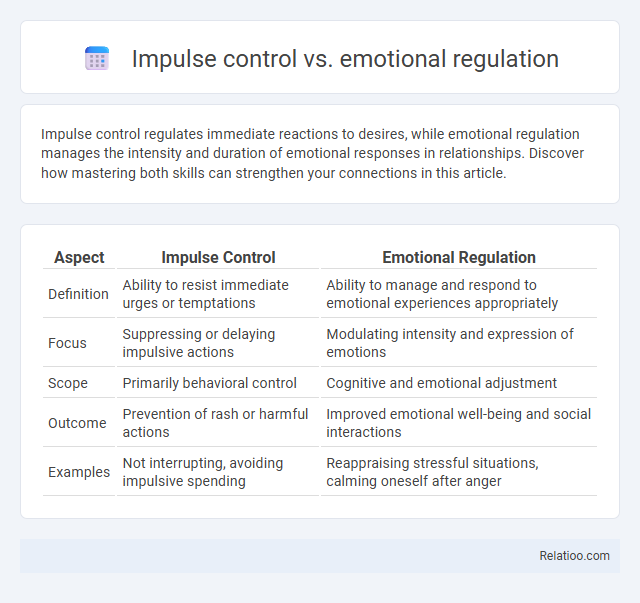Impulse control regulates immediate reactions to desires, while emotional regulation manages the intensity and duration of emotional responses in relationships. Discover how mastering both skills can strengthen your connections in this article.
Table of Comparison
| Aspect | Impulse Control | Emotional Regulation |
|---|---|---|
| Definition | Ability to resist immediate urges or temptations | Ability to manage and respond to emotional experiences appropriately |
| Focus | Suppressing or delaying impulsive actions | Modulating intensity and expression of emotions |
| Scope | Primarily behavioral control | Cognitive and emotional adjustment |
| Outcome | Prevention of rash or harmful actions | Improved emotional well-being and social interactions |
| Examples | Not interrupting, avoiding impulsive spending | Reappraising stressful situations, calming oneself after anger |
Understanding Impulse Control
Impulse control refers to your ability to resist immediate temptations and urges, preventing spontaneous actions that might have negative consequences. Emotional regulation, on the other hand, involves managing and responding to your emotional experiences in a balanced way. Understanding impulse control is crucial for making thoughtful decisions, maintaining self-discipline, and improving overall mental well-being.
What Is Emotional Regulation?
Emotional regulation involves managing and responding to emotional experiences in a healthy and adaptive way, enabling individuals to maintain emotional balance and prevent overwhelming reactions. Unlike impulse control, which focuses specifically on resisting immediate urges or behaviors, emotional regulation encompasses a broader skill set that includes recognizing emotions, understanding their triggers, and employing strategies such as mindfulness or cognitive reappraisal. Effective emotional regulation supports better decision-making, reduces stress, and improves interpersonal relationships by allowing individuals to navigate complex emotional situations with resilience.
Key Differences Between Impulse Control and Emotional Regulation
Impulse control refers to the ability to resist immediate temptations or urges, while emotional regulation involves managing and responding to emotional experiences in a healthy way. Key differences between impulse control and emotional regulation lie in their focus: impulse control targets behavior inhibition, whereas emotional regulation centers on modifying emotional responses. Developing your impulse control helps prevent rash actions, while emotional regulation supports maintaining psychological balance during stress or conflict.
The Science Behind Impulse Control
Impulse control involves the brain's prefrontal cortex managing immediate reactions to stimuli by inhibiting urges that may lead to negative outcomes. Emotional regulation engages neural circuits like the amygdala and prefrontal cortex to modulate emotional responses and maintain psychological balance. The science behind impulse control reveals that strengthening executive functions through cognitive training enhances self-discipline and reduces impulsivity, impacting behavior in decision-making and social interactions.
Mechanisms of Emotional Regulation
Emotional regulation involves complex mechanisms that allow you to monitor, evaluate, and modulate your emotional responses to different stimuli, primarily through cognitive reappraisal and mindfulness techniques. Unlike impulse control, which focuses on inhibiting immediate reactions, emotional regulation engages neural pathways in the prefrontal cortex to adaptively influence emotional intensity and duration. Understanding these mechanisms enhances your ability to manage stress, improve decision-making, and maintain psychological balance.
Why Both Skills Matter for Mental Health
Impulse control and emotional regulation are critical skills for maintaining mental health, as impulse control enables individuals to resist urges that may lead to harmful behaviors, while emotional regulation allows them to manage and respond to emotional experiences effectively. Difficulty in either skill increases the risk of anxiety, depression, and impulsive disorders, highlighting the need for interventions that target both cognitive and emotional processes. Developing these abilities improves decision-making, stress management, and overall psychological resilience, essential for long-term well-being.
Common Challenges in Developing Control and Regulation
Common challenges in developing impulse control and emotional regulation include difficulty in managing immediate reactions due to heightened emotional arousal, lack of effective coping strategies, and inconsistent practice of self-discipline techniques. Individuals often struggle to differentiate between impulsive urges and emotional responses, leading to erratic behaviors or emotional outbursts. Neurological factors such as underdeveloped prefrontal cortex function and environmental stressors further complicate the mastery of these skills.
Strategies to Improve Impulse Control
Improving impulse control involves techniques such as mindfulness meditation, cognitive-behavioral strategies, and delay of gratification exercises that help you pause and assess situations before reacting. Emotional regulation supports impulse control by enabling better management of intense feelings, thus reducing impulsive actions driven by emotional spikes. Consistent practice of these strategies strengthens neural pathways responsible for self-discipline, leading to improved decision-making and behavioral outcomes.
Techniques for Enhancing Emotional Regulation
Techniques for enhancing emotional regulation include mindfulness meditation, which increases awareness of emotional triggers, and cognitive reappraisal that reframes negative thoughts to reduce emotional intensity. Deep breathing exercises and progressive muscle relaxation activate the parasympathetic nervous system, promoting calmness during emotional distress. Building emotional regulation skills improves impulse control by creating a buffer between intense emotions and reactive behaviors.
Building a Balanced Approach for Emotional Well-being
Effective emotional well-being relies on a balanced approach that integrates impulse control and emotional regulation, where impulse control focuses on resisting immediate temptations and emotional regulation involves managing and responding to emotional experiences appropriately. Building skills in both areas enhances self-awareness, reduces impulsivity, and fosters healthier decision-making patterns. Combining these strategies supports resilience and promotes long-term psychological stability.

Infographic: Impulse control vs Emotional regulation
 relatioo.com
relatioo.com